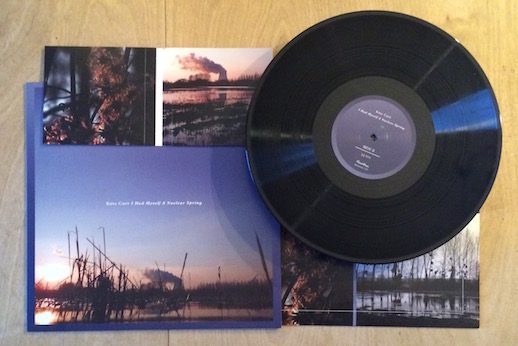 Ahead of tomorrow’s Rivertones release of Kate Carr’s I Had Myself A Nuclear Spring, we wanted to return to Luke Turner‘s review of the album from January this year – at which time it was a limited USB-only release on Kate’s label, Flaming Pines. You can order a copy of the album on digital, CD and vinyl formats here.
Ahead of tomorrow’s Rivertones release of Kate Carr’s I Had Myself A Nuclear Spring, we wanted to return to Luke Turner‘s review of the album from January this year – at which time it was a limited USB-only release on Kate’s label, Flaming Pines. You can order a copy of the album on digital, CD and vinyl formats here.
*
Ever since Charles De Gaulle created the Commissariat à l’Énergie Atomique shortly after the end of the Second World War, the French government has displayed a marked enthusiasm for nuclear power, with 75% of the country’s electricity coming from its 59 fusion reactors. After the Fukushima disaster, however, public opinion on nuclear energy in the country has waned, with a majority of people now opposing, rather than supporting its use.
Given that the Japanese disaster was caused by a tsunami inundating the Fukushima plant, Kate Carr’s I Had Myself A Nuclear Spring makes, at times, for an unsettling listen. Carr had travelled to the small French town of Marnay, two hours to the west of Paris by train, to make recordings of the Seine, a river that has fascinated her since as a child she read a book about an artist attempting to paint it. As she arrived, the river was in spate after heavy rains, and a Front National candidate had recently booted out the socialist mayor.
A glance at an aerial photograph of the Centrale Nucléaire de Nogent, just outside Marnay, reveals a mosaic of soggy vegetation in differing greens closing in on the eddies of the Seine, the twin cooling towers and steel and concrete of the reactor complex hard against it. Plumes of steam drift away across the marshes towards the regimented farmland of northern France. The Seine is a river lodged in our English imaginations largely for the stretch that flows through Paris, prettified by dimly lit embankments and crossed with bridges straining under the weight of locks put there by the lovelorn gullible. In the same way, few in Britain think of the Thames for the marshes of Grain or the old Victorian rubbish dumps at Tilbury. For me the Severn is one of the rivers where I learned to fish, rather than the estuary where French company EDF, which operates the Centrale Nucléaire de Nogent, is hoping to build the new Hinkley Point C nuclear power station at exorbitant cost to the UK taxpayer.
Nuclear power of course has always had a symbiotic relationship with water, but in her liner notes, Carr doesn’t reveal how much or indeed whether the marshland habitat that surrounds the power station is there despite or because of it. This is no bad thing – the ambiguity rather suits nuclear power itself, with its ability to offer an alternative to fossil fuels on one hand, and its risk to both human safety and the natural world on the other. She explores this by keeping her sound palette in perfect balance, both soggy and industrial, wild and harshly electric. On Confluence, for instance, there’s a background humming drone that might be a recording from the power station itself, or created from samples, sequencers or instruments at a later date. There are melodic plips and whistles that could be dripping water or bird calls, and occasional guitar eddies, like a stick being carried on the river’s surface through the reeds. Such was the electromagnetic interference that the sound artist’s usual tools of the trade frequently didn’t work – hydrophones, for instance, were apparently largely useless. The power station blocked Carr’s interpretation of the natural landscape, which is perhaps why The Darkness Of Riverbeds is all gently pressing tension, hums and sudden popping release, creaks of undergrowth and whistles that might be lost from a submarine sonar, bouncing upriver from the North Sea.
The guitar refrain on Rising Waters (alone in the dark) is what gives the piece its emotional, elegiac heft. Carr’s great success throughout is to use melody quietly and sparingly to draw the ear towards the uneasy dialogue between simmering electricity and the sounds of the marsh, the nuclear and the wildfowl. Indeed, I rather like the way that to me I Had Myself A Nuclear Winter doesn’t seem to make any judgements as it paints a vivid portrait of technology, flora, water and fauna in unexpected proximity. It does, however, seem to end with a question. Final track Plumes And Sunsets combines a straight field recording of bird song, machine hum, water and the distant shout of a man whose breath is lung-full, suggesting that he might be running. This though isn’t the strange concluding moment of threat, but the sudden cut, after forty-seven seconds, to silence.
*
Kate Carr joins us at this year’s Good Life Experience, taking place in Hawarden, Flintshire, 16-18 September. More info.
Kate plays London’s Café OTO on Thursday 22 September, with support from The London Sound Survey and DJ Nick Luscombe. More info.
Kate Carr on Caught by the River/on Twitter
Luke Turner on Caught by the River/on Twitter